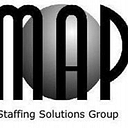
Lead Product Manager, AI (Remote)
Map Ssg
Full-time
Remote
United States
Responsibilities
- Define and Lead Model Capability Roadmaps: Shape the development and deployment strategy for AI model behavior and capabilities. Partner with research and engineering to translate emerging model potential into product impact that aligns with company objectives and user needs.
- Guide Responsible AI Development and Deployment: Proactively manage the behavior, safety, and reliability of AI systems in production. Lead efforts to identify misalignment risks, define success criteria for “safe and useful” model behavior, and operationalize evaluation frameworks.
- Drive Research–Product Integration: Act as a connective tissue between frontier AI research and product application. Evaluate early technical breakthroughs, determine productization paths, and prioritize research that unlocks high-leverage capabilities.
- Establish Standards for Model Evaluation and Feedback Loops: Design, iterate, and scale systems for red-teaming, user feedback, and evaluation that shape the ongoing behavior of models. Define key metrics for model usefulness, accuracy, fairness, and trust.
- Influence Company-Wide AI Strategy: Collaborate with leadership, legal, ethics, and technical teams to drive long-term strategic bets on model direction, infrastructure, and responsible AI governance. Represent product priorities in high-stakes internal and external discussions.
- Lead Cross-Functional Product Teams: Mentor and manage PMs and workstreams, ensuring tight execution across research, design, eng, and operations. Create clarity in ambiguity and drive alignment in frontier spaces with limited precedent.
Requirements
- 8+ years of product management experience, with at least 2 years working directly on AI/ML-driven products or platforms.
- Solid understanding of machine learning fundamentals, including supervised and unsupervised learning, model evaluation, and deployment workflows.
- Exceptional product leadership and execution skills, including roadmap development, stakeholder alignment, and delivery of high-impact features.
- Track record of launching and scaling AI products, ideally including experience navigating model explainability, fairness, and deployment challenges.
- Experience partnering with data science and engineering teams, with the ability to translate technical concepts into clear product decisions.
- Strong data intuition and analytical skills, with experience defining data needs, evaluating data quality, and making decisions based on data insights.
- Demonstrated experience in ethical AI development, data privacy considerations, and aligning AI use with regulatory or compliance frameworks.
- Demonstrate Technical Proficiency in AI & ML Fundamentals: Leverage a strong foundational understanding of machine learning, deep learning, and data science to collaborate effectively with engineering teams and ensure technical feasibility aligns with product vision.
- Experience mentoring or leading others, including guiding PMs, managing small pods, or taking ownership of a product pillar.
- Clear, confident communicator, comfortable navigating between technical teams, leadership, and non-technical stakeholders.
- Bias Toward Action: Demonstrated ability to take initiative, make decisions under uncertainty, and move projects forward even in the face of ambiguity.
- Entrepreneurial Spirit: Strong adaptability to changing business needs with a knack for building and optimizing processes.
- Communication: Excellent communication skills, capable of explaining complex technical concepts to non-technical stakeholders.
- Remote Work Adaptability: Comfort with remote work environments, demonstrating the ability to stay productive and connected with the team irrespective of physical location.
- Continuous Improvement: A willingness to question assumptions and a commitment to continuous improvement.
Preferred Qualifications
- Experience working in healthtech, SaaS, or data-centric environments, especially in early-stage or scaling startups.
- Familiarity with AI infrastructure and MLOps tools, such as model monitoring platforms, automated training pipelines, or inference optimization systems.
- Comfort with scripting and querying languages, such as Python or SQL, sufficient to support technical discovery and collaboration.
- Exposure to user-centered product development, including design thinking, UX research, and human-in-the-loop AI solutions.
- Advanced degree in a technical or business discipline, such as Computer Science, Data Science, Engineering, or an MBA.
Category
AI & Machine Learning